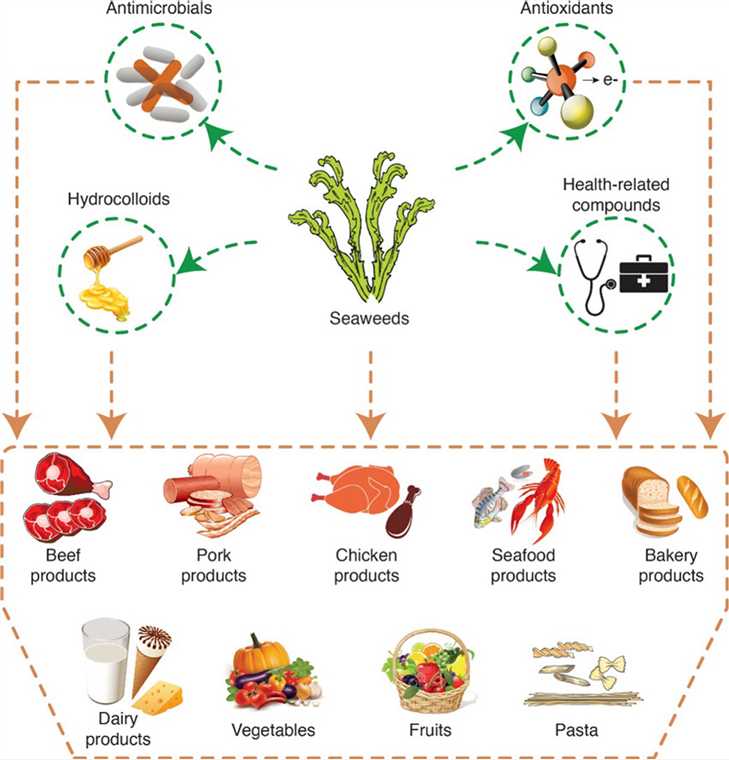More than 2 billion people are undernourished due to a lack of essential vitamins and minerals, especially in developing countries. Researchers are adopting new technologies in agricultural production, food processing, and packaging to increase food production and reduce waste. Seaweeds have been used as food since ancient times, mainly in Asian countries. In Western countries, their main use has been in industrial production as a gelling agent. Today, the consumption of seaweed has increased significantly in more countries outside of Asia. Seaweeds have an excellent dietary composition, displaying relatively high protein levels, essential amino acids, carbohydrates, lipids, polyphenols, pigments, and vitamins. Amongst these properties, the range of shapes, colors, textures, and flavours make seaweeds attractive as food. They are also one of the richest sources of natural antioxidants and antimicrobial agents, making macroalgae and their bioactive compounds food more functional, improving health to fight different diseases and nutritious.
 Fig 1. Application of seaweeds to develop new food products with enhanced shelf-life, quality, and health-related beneficial properties. (Roohinejad S, et al., 2017)
Fig 1. Application of seaweeds to develop new food products with enhanced shelf-life, quality, and health-related beneficial properties. (Roohinejad S, et al., 2017)
Seaweeds are a renewable source of high value-added compounds that have attracted the interest of the food industry. Our scientists focus on the addition of seaweeds and seaweed extracts to the bakery, dairy, fish, meat, or vegetable products to develop new functional foods, enhancing their nutritional content, quality, and beneficial health-related properties. In addition, we apply seaweeds to food products based on their technical properties (gelling, thickening, and stabilizing properties).
Lifeasible is constantly developing the potential of food production from macroalgae and is committed to providing specialist solutions for seaweed food applications.
We add ingredients with high fiber content, such as seaweed, to regular meat products. In addition, we offer services for testing meat products for color, pH, lipid oxidation, and microbial spoilage parameters.
We add high-quality lipids and seaweed extracts to seafood. In addition, we offer a service to evaluate the nutritional, organoleptic, and structural properties of seafood products.
Bread and dough products are some of the most widely consumed foods in the world and have great potential for transporting functional ingredients from the sea. We add seaweed powder or extract to bread to improve its physicochemical and nutritional properties. We also optimize the addition of seaweed to improve the total dietary fiber and phytochemical content of breadsticks using the Response Surface Method (RSM). We offer an overall assessment service for the aroma, color, texture, taste, and overall acceptability of seaweed breadsticks.
We add seaweed to dairy products to enhance their nutritional value and extend their shelf life. In addition, the richness of essential minerals and trace elements in seaweed makes it possible to obtain healthy cheeses and functional dairy products.
We add wakame to pasta to increase the biofunctional, microstructural, and qualitative characteristics of the pasta without affecting the organoleptic, technical, and textural characteristics of the product. In addition, we develop seaweed for gluten-free products designed for people with coeliac disease.
Lifeasible is constantly exploring the maximum potential of seaweed applications. We try to add seaweed or seaweed extracts in food to improve their health value, shelf life, and overall quality. We are your trusted partner in all aspects of seaweed research. If you are interested in our solutions, please do not hesitate to contact us.
Reference
Lifeasible has established a one-stop service platform for plants. In addition to obtaining customized solutions for plant genetic engineering, customers can also conduct follow-up analysis and research on plants through our analysis platform. The analytical services we provide include but are not limited to the following:
Get Latest Lifeasible News and Updates Directly to Your Inbox
Adaptive Evolutionary Mechanism of Plants
February 28, 2025
Unraveling Cotton Development: Insights from Multi-Omics Studies
February 27, 2025